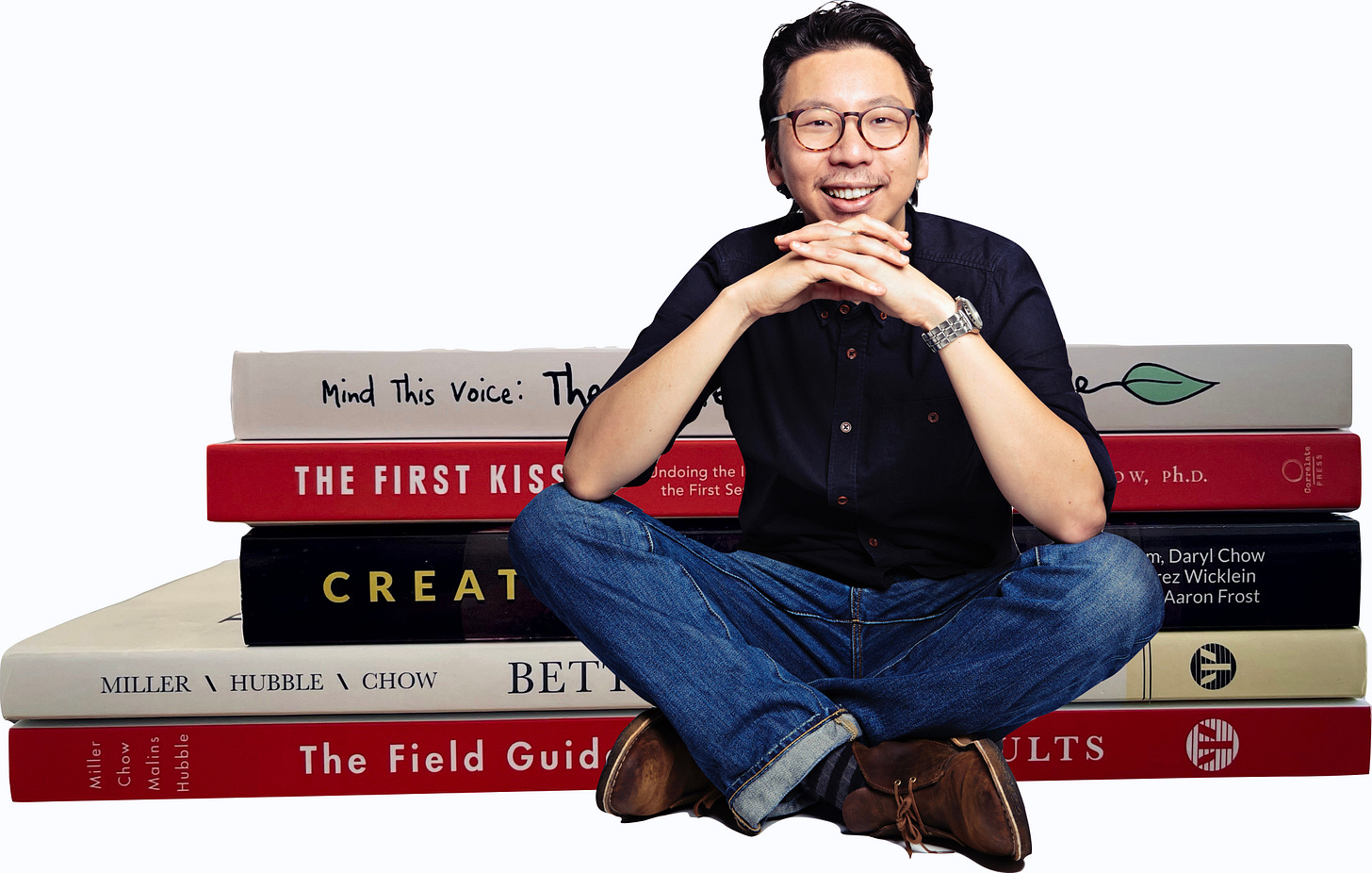Does Psychotherapy Have to be a Lone Sport? Frontiers Friday #203 ⭕️
Deprivatisation of the practice of psychotherapy.
Buried in this somewhat obscure edited book, The Development of Professional Expertise1, K Anders Ericsson, the leading psychologist on the study of deliberate practice, articulated the following concern:
Most professionals—such as doctors, nurses, stockbrokers, and accountants—do not receive the constant pressure from performing in front of an audience of paying ticket holders, like actors, musicians, and athletes. The lack of scrutiny and perhaps feedback may be an important difference that explains why many doctors do not spontaneously adopt the best practice methods for treating their patients, and spend a rather modest amount of time engaged in deliberate practice and effortful training to improve and maintain their skills…
It is interesting to compare these doctors and other professionals to professional musicians and soccer players, who spend vastly more time in training and the acquisition of new music repertoire or tactics than they spend in public performance.
(p. 422)
The work of psychotherapy is lonely endeavuor.
Even though psychotherapy is an ongoing ebb and flow of emotionally charged interaction between the therapist and client2, most practitioners, especially private practitioners, feel the absence of connection with other clinicians. How often do we get to share our real struggles? To this effect, because psychotherapy can be such a private affair, we often lack the context to work collaboratively at improving our craft.
As Ericsson stated, the lack of scrutiny from the eyes of another and the lack of objective feedback—and perhaps even the lack of incentives—hinder the possibility of benefiting from another mind pushing us to the next level in our clinical performance.
Genius vs Scenius
Musician and producer Brian Eno (2009) coined the term scenius3, explaining that “genius is individual, scenius is communal.” Eno’s point was that we should look beyond ourselves as standalones to see ourselves as individuals who can facilitate creativity and growth within a community.
See Related:
Two Minds Make a Mindset
Take another example, the ever popular notion self-attribution theory of ability (i.e., fixed and growth mindsets; Dweck, 2006)4.
A person who endorses a growth mindset believes that his abilities can be cultivated and developed through effort. On the flip side, a person who has a fixed mindset views his abilities as innate and stable across time, an attitude that presumes you either have it or you don’t.
Instead, the development of mindsets must be seen within a systemic lens, not solely as an individual construct. Going beyond the constrained dichotomy, we must acknowledge that the development of mindsets is determined by the relational context.
It is the task of the teacher/coach/supervisor to foster a safe environment that recognises errors as part of the learning process and distinguishes failing from failure (“Here's something I didn’t do well.” vs. “I’m no good”), rather than an overemphasis on performance.
See Related:
For example, a supervisee might feel worried and anxious about sharing an at-risk case with his supervisor if he feels that he might feel questioned about his competence. In contrast, the same supervisee can feel safe and supported receiving emotional support and specific guidance on how to handle the case better, without being patronised with a pat-on-the-back approach. There should be no reason to shift blame onto a client for a poor outcome. This balance is vital in managing the impact on the supervisee’s self~esteem. Interestingly, Niiya, Brook, and Crocker (2010)5 found that even people with a growth mindset who feel that their self-worth is contingent on their performance might self-handicap (i.e., avoid practicing) their work to protect against bruising their ego.
Once we learn to look beyond facing criticism about our own work and embrace our imperfections and vulnerabilities, we can share our craft and thus create a democratic learning environment. While remaining respectful of our clients who entrust us with their privilege of confidentiality, we can seek to be part of an ecology of talent—a scenius community that fosters excellence.
No therapist is an island.6
P/S: Please pardon any typos. I’m heading home to see my mom.
Notice Board
This is the first time we are offering this.
A small “Scenius” group to come together with Scott Miller and I.
For more, see here.
Daryl Chow Ph.D. is the author of The First Kiss, co-author of Better Results, The Write to Recovery, Creating Impact, and the latest book The Field Guide to Better Results.
Ericsson, K. A. (2009). Enhancing the development of professional performance: Implications from the study of deliberate practice. In K. A. Ericsson (Ed), Development of professional expertise: Toward measurement of expert perfore mance and design of optimal learning environments (pp. 405—431). New York, NY: Cambridge University Press.
Frank, J. D., & Frank, J. B. (1993). Persuasion and healing: A comparative study of psychotherapy (3rd ed.). Johns Hopkins University Press.
Eno, B. (2009). A press conference with the luminous Sydney festival curator, Brian Eno. Retrieved from http://www.moredarkthanshark.org/feature_1uminouthtml
Dweck, C. S. (2006). Mindset: The new psychology of success. New York, NY: Random House.
Niiya, Y., Brook, A. T., & Crocker, (2010). Contingent self/worth and self handicapping: Do incremental theorists protect selflesteem.7 Self and Identity, 9, 276—297. http://dx.doi.org/IO.1080/15298860903054233
This essay is in part adapted from this chapter:
Chow, D. (2017). The practice and the practical: Pushing your clinical performance to the next level. In D. S. Prescott, C. L. Maeschalck, & S. D. Miller (Eds.), Feedback-informed treatment in clinical practice: Reaching for excellence (pp. 323–355). American Psychological Association.




